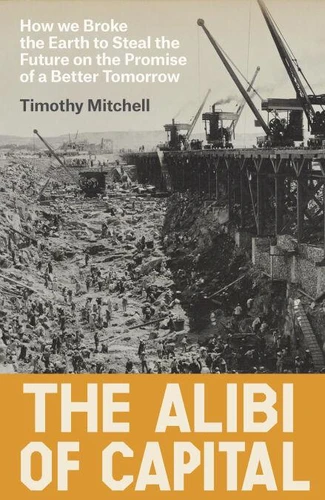The Alibi of Capital. How We Broke the Earth to Steal the Future on the Promise of a Better Tomorrow
Par :Formats :
Actuellement indisponible
Cet article est actuellement indisponible, il ne peut pas être commandé sur notre site pour le moment. Nous vous invitons à vous inscrire à l'alerte disponibilité, vous recevrez un e-mail dès que cet ouvrage sera à nouveau disponible.
Disponible dans votre compte client Decitre ou Furet du Nord dès validation de votre commande. Le format ePub protégé est :
- Compatible avec une lecture sur My Vivlio (smartphone, tablette, ordinateur)
- Compatible avec une lecture sur liseuses Vivlio
- Pour les liseuses autres que Vivlio, vous devez utiliser le logiciel Adobe Digital Edition. Non compatible avec la lecture sur les liseuses Kindle, Remarkable et Sony
- Non compatible avec un achat hors France métropolitaine
 , qui est-ce ?
, qui est-ce ?Notre partenaire de plateforme de lecture numérique où vous retrouverez l'ensemble de vos ebooks gratuitement
Pour en savoir plus sur nos ebooks, consultez notre aide en ligne ici
- Nombre de pages432
- FormatePub
- ISBN978-1-83674-230-2
- EAN9781836742302
- Date de parution10/03/2026
- Protection num.Adobe DRM
- Infos supplémentairesepub
- ÉditeurVerso
Résumé
The author of the acclaimed Carbon Democracy argues that capitalism has always operated by consuming the future-and concealing its theft. We live in an age in which extraordinary wealth seems to arrive from unfathomable sources, such as when tech firms that have never made a profit are valued at billions of dollars. While seeming extraordinary, this mode of acquiring unearned wealth is, in fact, commonplace.
It is a key to understanding how capitalism came into being and a clue to grasping why the catastrophe of climate collapse has come upon us. The value is created by consuming the future. The Alibi of Capital asks how we came to organize collective life on the principle of capturing the future, explores the development of this principle in the imperial expansion of the West, and examines how lives today are encumbered by the repayment of earlier extractions.
The book identifies the forms of capitalisation, credit, and coercion that turn prospective assets into present income. Rejecting the common idea that claims on the future create only financial or fictitious capital, it traces the terraforming projects-the destruction of rivers, the colonizing of territory, the expansion of infrastructures, and the burning of carbon-through which consuming the future has operated.
Arguing that terms like finance, technology, the economy and its growth provide alibis that conceal this mode of extraction, it develops a new approach for understanding how the impoverishment operates.
It is a key to understanding how capitalism came into being and a clue to grasping why the catastrophe of climate collapse has come upon us. The value is created by consuming the future. The Alibi of Capital asks how we came to organize collective life on the principle of capturing the future, explores the development of this principle in the imperial expansion of the West, and examines how lives today are encumbered by the repayment of earlier extractions.
The book identifies the forms of capitalisation, credit, and coercion that turn prospective assets into present income. Rejecting the common idea that claims on the future create only financial or fictitious capital, it traces the terraforming projects-the destruction of rivers, the colonizing of territory, the expansion of infrastructures, and the burning of carbon-through which consuming the future has operated.
Arguing that terms like finance, technology, the economy and its growth provide alibis that conceal this mode of extraction, it develops a new approach for understanding how the impoverishment operates.
The author of the acclaimed Carbon Democracy argues that capitalism has always operated by consuming the future-and concealing its theft. We live in an age in which extraordinary wealth seems to arrive from unfathomable sources, such as when tech firms that have never made a profit are valued at billions of dollars. While seeming extraordinary, this mode of acquiring unearned wealth is, in fact, commonplace.
It is a key to understanding how capitalism came into being and a clue to grasping why the catastrophe of climate collapse has come upon us. The value is created by consuming the future. The Alibi of Capital asks how we came to organize collective life on the principle of capturing the future, explores the development of this principle in the imperial expansion of the West, and examines how lives today are encumbered by the repayment of earlier extractions.
The book identifies the forms of capitalisation, credit, and coercion that turn prospective assets into present income. Rejecting the common idea that claims on the future create only financial or fictitious capital, it traces the terraforming projects-the destruction of rivers, the colonizing of territory, the expansion of infrastructures, and the burning of carbon-through which consuming the future has operated.
Arguing that terms like finance, technology, the economy and its growth provide alibis that conceal this mode of extraction, it develops a new approach for understanding how the impoverishment operates.
It is a key to understanding how capitalism came into being and a clue to grasping why the catastrophe of climate collapse has come upon us. The value is created by consuming the future. The Alibi of Capital asks how we came to organize collective life on the principle of capturing the future, explores the development of this principle in the imperial expansion of the West, and examines how lives today are encumbered by the repayment of earlier extractions.
The book identifies the forms of capitalisation, credit, and coercion that turn prospective assets into present income. Rejecting the common idea that claims on the future create only financial or fictitious capital, it traces the terraforming projects-the destruction of rivers, the colonizing of territory, the expansion of infrastructures, and the burning of carbon-through which consuming the future has operated.
Arguing that terms like finance, technology, the economy and its growth provide alibis that conceal this mode of extraction, it develops a new approach for understanding how the impoverishment operates.




